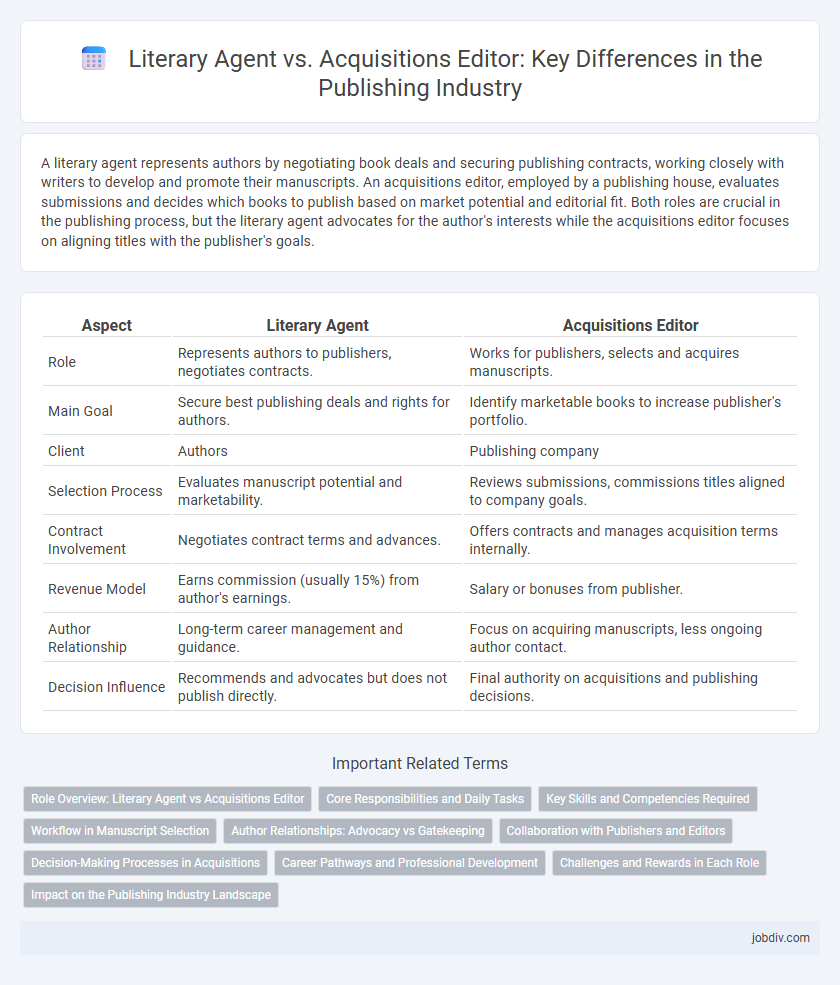A literary agent represents authors by negotiating book deals and securing publishing contracts, working closely with writers to develop and promote their manuscripts. An acquisitions editor, employed by a publishing house, evaluates submissions and decides which books to publish based on market potential and editorial fit. Both roles are crucial in the publishing process, but the literary agent advocates for the author's interests while the acquisitions editor focuses on aligning titles with the publisher's goals.
Table of Comparison
| Aspect | Literary Agent | Acquisitions Editor |
|---|---|---|
| Role | Represents authors to publishers, negotiates contracts. | Works for publishers, selects and acquires manuscripts. |
| Main Goal | Secure best publishing deals and rights for authors. | Identify marketable books to increase publisher's portfolio. |
| Client | Authors | Publishing company |
| Selection Process | Evaluates manuscript potential and marketability. | Reviews submissions, commissions titles aligned to company goals. |
| Contract Involvement | Negotiates contract terms and advances. | Offers contracts and manages acquisition terms internally. |
| Revenue Model | Earns commission (usually 15%) from author's earnings. | Salary or bonuses from publisher. |
| Author Relationship | Long-term career management and guidance. | Focus on acquiring manuscripts, less ongoing author contact. |
| Decision Influence | Recommends and advocates but does not publish directly. | Final authority on acquisitions and publishing decisions. |
Role Overview: Literary Agent vs Acquisitions Editor
Literary agents represent authors and negotiate publishing deals, focusing on securing the best contracts and advocating for their clients' interests. Acquisitions editors work within publishing houses to evaluate manuscripts, acquire rights, and shape the editorial direction of the company's catalogue. While literary agents primarily serve authors, acquisitions editors aim to select marketable content aligned with the publisher's strategic goals.
Core Responsibilities and Daily Tasks
Literary agents primarily focus on discovering new authors, negotiating book deals, and managing author relationships to secure the best publishing contracts. Acquisitions editors evaluate manuscripts, coordinate with editorial teams, and make final decisions on which titles to publish based on market trends and company goals. Both roles require strong industry knowledge, but agents prioritize author representation while acquisitions editors concentrate on content selection and development.
Key Skills and Competencies Required
Literary agents excel in negotiation, author representation, and market savvy to secure publishing deals that align with their clients' goals. Acquisitions editors demonstrate strong editorial judgment, market analysis, and project management skills to identify and develop commercially viable manuscripts for their publishing house. Both roles require excellent communication, industry knowledge, and relationship-building competencies to succeed in the competitive publishing landscape.
Workflow in Manuscript Selection
Literary agents prioritize discovering new talent and pitching manuscripts to publishers, managing author relationships and contract negotiations to secure publishing deals. Acquisitions editors evaluate submissions to determine market viability, working closely with authors to refine manuscripts and align projects with the publisher's catalog and audience. The workflow difference lies in agents promoting and selling manuscripts, while acquisitions editors focus on selection and development within the publishing house.
Author Relationships: Advocacy vs Gatekeeping
Literary agents prioritize author relationships by advocating for their clients' creative and financial interests throughout the publishing process, ensuring favorable contracts and career development. Acquisitions editors serve as gatekeepers, evaluating manuscripts to select works that fit the publisher's market strategy while maintaining editorial standards. The dynamic between advocacy and gatekeeping shapes how authors navigate industry opportunities and challenges.
Collaboration with Publishers and Editors
Literary agents serve as key intermediaries between authors and acquisitions editors, negotiating contracts and advocating for the author's interests to secure favorable publishing deals. Acquisitions editors collaborate closely with literary agents to identify promising manuscripts that align with the publisher's market strategy and editorial vision. This partnership enhances the selection process, ensuring high-quality content reaches the publishing house while maximizing commercial potential.
Decision-Making Processes in Acquisitions
Literary agents assess manuscripts based on market potential, author platform, and originality to secure publishing deals, while acquisitions editors evaluate submissions through a combination of editorial quality, alignment with the publisher's catalog, and projected sales performance. Decision-making in acquisitions involves acquisitions editors conducting thorough market research, financial analysis, and editorial review to select works that balance commercial viability with literary merit. Both roles require collaboration, but acquisitions editors hold the final authority in contract offers, driven by data on audience trends and sales forecasts.
Career Pathways and Professional Development
A literary agent typically builds a career through extensive networking, contract negotiation skills, and deep knowledge of market trends to represent authors and secure publishing deals. Acquisitions editors advance by honing editorial expertise, market analysis, and relationship management with authors and agents, focusing on selecting manuscripts that align with the publisher's catalog. Both roles require ongoing professional development in industry standards, rights management, and emerging publishing technologies to remain competitive.
Challenges and Rewards in Each Role
Literary agents face the challenge of securing publishing deals and negotiating contracts while advocating for their authors, balancing the need to market diverse manuscripts in a competitive industry. Acquisitions editors encounter the pressure of identifying marketable manuscripts and aligning them with the publisher's strategic goals, often managing tight deadlines and editorial constraints. Both roles offer rewards such as shaping literary careers, influencing the publishing landscape, and fostering new voices, with agents benefiting from author partnerships and editors from curating successful book lists.
Impact on the Publishing Industry Landscape
Literary agents serve as crucial intermediaries between authors and publishers, securing favorable contracts and advocating for authors' creative rights, which shapes authors' opportunities and market presence. Acquisitions editors drive the publishing industry's content direction by selecting manuscripts that align with market trends and the publisher's strategic goals, directly influencing literary diversity and commercial success. The collaboration and tension between these roles significantly impact the industry landscape by balancing author representation with market-driven publishing decisions.
Literary Agent vs Acquisitions Editor Infographic

 jobdiv.com
jobdiv.com